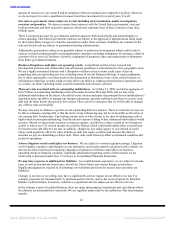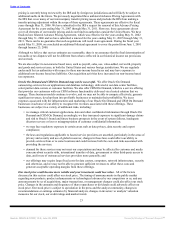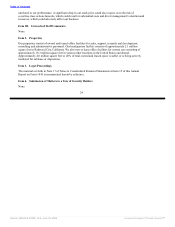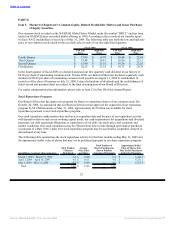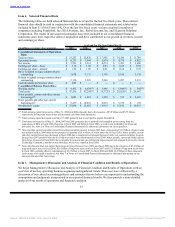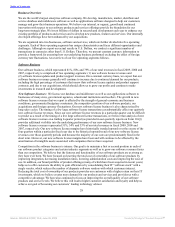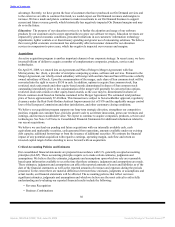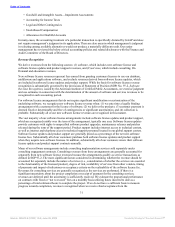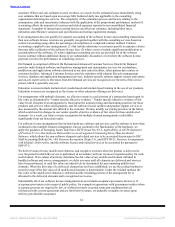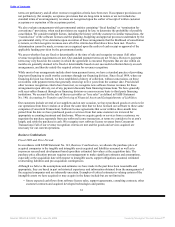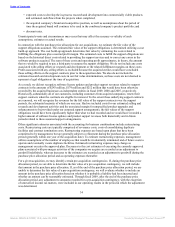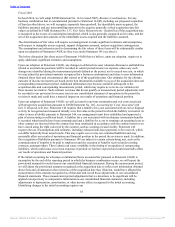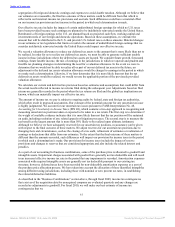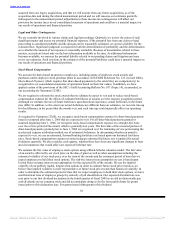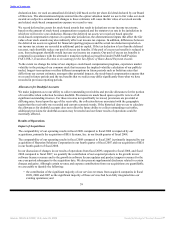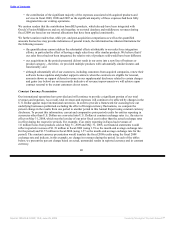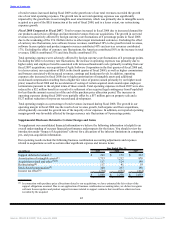Oracle 2008 Annual Report Download - page 37
Download and view the complete annual report
Please find page 37 of the 2008 Oracle annual report below. You can navigate through the pages in the report by either clicking on the pages listed below, or by using the keyword search tool below to find specific information within the annual report.
Table of Contents
customer. When total cost estimates exceed revenues, we accrue for the estimated losses immediately using
cost estimates that are based upon an average fully burdened daily rate applicable to the consulting
organization delivering the services. The complexity of the estimation process and factors relating to the
assumptions, risks and uncertainties inherent with the application of the proportional performance method of
accounting affects the amounts of revenues and related expenses reported in our consolidated financial
statements. A number of internal and external factors can affect our estimates, including labor rates,
utilization and efficiency variances and specification and testing requirement changes.
If an arrangement does not qualify for separate accounting of the software license and consulting transactions,
then new software license revenues are generally recognized together with the consulting services based on
contract accounting using either the percentage-of-completion or completed-contract method. Contract
accounting is applied to any arrangements: (1) that include milestones or customer specific acceptance criteria
that may affect collection of the software license fees; (2) where services include significant modification or
customization of the software; (3) where significant consulting services are provided for in the software
license contract without additional charge or are substantially discounted; or (4) where the software license
payment is tied to the performance of consulting services.
On Demand is comprised of Oracle On Demand and Advanced Customer Services. Oracle On Demand
provides multi-featured software and hardware management and maintenance services for our database,
middleware and applications software delivered at our data center facilities, select partner data centers or
customer facilities. Advanced Customer Services provide customers with solution lifecycle management
services, database and application management services, industry-specific solution support centers and remote
and on-site expert services. Revenues from On Demand services are recognized over the term of the service
period, which is generally one year.
Education revenues include instructor-led, media-based and internet-based training in the use of our products.
Education revenues are recognized as the classes or other education offerings are delivered.
For arrangements with multiple elements, we allocate revenue to each element of a transaction based upon its
fair value as determined by “vendor specific objective evidence.” Vendor specific objective evidence of fair
value for all elements of an arrangement is based upon the normal pricing and discounting practices for those
products and services when sold separately, and for software license updates and product support services is
also measured by the renewal rate offered to the customer. We may modify our pricing practices in the future,
which could result in changes in our vendor specific objective evidence of fair value for these undelivered
elements. As a result, our future revenue recognition for multiple element arrangements could differ
significantly from our historical results.
For software license arrangements that include hardware, software and services, and the software is more than
incidental to the multiple element arrangement, but not essential to the functionality of the hardware, we
apply the guidance of Emerging Issues Task Force (EITF) Issue No. 03-5, Applicability of AICPA Statement
of Position 97-2 to Non-Software Deliverables in an Arrangement Containing More-Than-Incidental
Software, which allows the non-software elements and related services to be accounted for pursuant to SEC
Staff Accounting Bulletin No. 104, Revenue Recognition (Topic 13), and EITF 00-21, Revenue Arrangements
with Multiple Deliverables, and the software license and related services to be accounted for pursuant to
SOP 97-2.
We defer revenues for any undelivered elements, and recognize revenues when the product is delivered or
over the period in which the service is performed, in accordance with our revenue recognition policy for each
such element. If we cannot objectively determine the fair value of any undelivered element included in
bundled software and service arrangements, we defer revenues until all elements are delivered and services
have been performed, or until fair value can objectively be determined for any remaining undelivered
elements. When the fair value of a delivered element has not been established, we use the residual method to
record revenue if the fair value of all undelivered elements is determinable. Under the residual method, the
fair value of the undelivered elements is deferred and the remaining portion of the arrangement fee is
allocated to the delivered elements and is recognized as revenue.
Substantially all of our software license arrangements do not include acceptance provisions. However, if
acceptance provisions exist as part of public policy, for example in agreements with government entities when
acceptance periods are required by law, or within previously executed terms and conditions that are
referenced in the current agreement and are short-term in nature, we generally recognize revenues upon
delivery provided the acceptance
32
Source: ORACLE CORP, 10-K, June 29, 2009 Powered by Morningstar® Document Research℠


